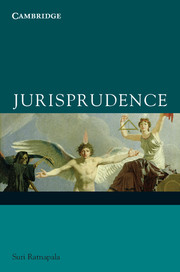Book contents
- Frontmatter
- Contents
- Acknowledgements
- List of Figures
- 1 Introduction
- PART 1 LAW AS IT IS
- 2 British Legal Positivism
- 3 Germanic Legal Positivism: Hans Kelsen's Quest for the Pure Theory of Law
- 4 Realism in Legal Theory
- PART 2 LAW AND MORALITY
- PART 3 SOCIAL DIMENSIONS OF LAW
- PART 4 RIGHTS AND JUSTICE
- References
- Index
2 - British Legal Positivism
from PART 1 - LAW AS IT IS
- Frontmatter
- Contents
- Acknowledgements
- List of Figures
- 1 Introduction
- PART 1 LAW AS IT IS
- 2 British Legal Positivism
- 3 Germanic Legal Positivism: Hans Kelsen's Quest for the Pure Theory of Law
- 4 Realism in Legal Theory
- PART 2 LAW AND MORALITY
- PART 3 SOCIAL DIMENSIONS OF LAW
- PART 4 RIGHTS AND JUSTICE
- References
- Index
Summary
Legal positivism is the most influential school of thought in jurisprudence. This is hardly surprising, as the idea of law as the creation of a human law giver that lies at its heart is a common intuition. Ask the person on the street whence comes the law, and expect to hear that law is the work of parliaments, monarchs or other rulers. Ask a lawyer what the law is, and anticipate an answer drawn from legislation and judicial precedents. The ancients may have regarded the law as received from divine sources but in the modern world, where most laws have a known human author, people think of law as the product of designing human minds.
British legal positivists regard the law as ‘social fact’, by which they mean that law is found in the actual practices or the institutions of society. Legal positivists have their significant disagreements but they share the common aim of helping people understand the law as it actually is. A survey of positivist writings on the nature of law reveals the following main themes:
Law is the creation of human agents. Even custom is not law unless it is recognised and enforced by a human authority.
The law as it is can be distinguished from notions of what the law ought to be. Law is social fact. It is found as rules declared by authorities such as legislatures and courts, or in the actual practices of those who enforce the law.
[…]
- Type
- Chapter
- Information
- Jurisprudence , pp. 21 - 57Publisher: Cambridge University PressPrint publication year: 2009



